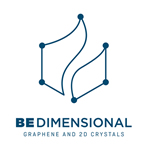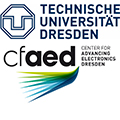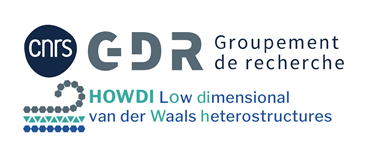|
|
 |
|
|
 |
|
The Phantoms Foundation based in Madrid, Spain, is a Professional Conference Organiser specialised in the planning and execution of conferences and online meetings focused on Nanoscience & Nanotechnology and in particular "Graphene and 2DM". The Foundation focuses its activities on Nanoscience and Nanotechnology (N&N) and is now a key actor in structuring and fostering European Excellence and enhancing collaborations in these fields. The Phantoms Foundation, a non-profit organisation, gives as well high level management profile to National and European scientific projects (Involved in 11 European projects in the last 10 years either as coordinator or partner) and provides an innovative platform for dissemination, transfer and transformation of basic nanoscience knowledge, strengthening interdisciplinary research in nanoscience and nanotechnology and catalysing collaboration among international research groups. |
|
|
The Foundation also works in close collaboration with Spanish and European Governmental Institutions to provide focused reports and catalogues on N&N related research areas: |
|
- Coordinator/Editor of the Catalogue of Nanoscience & Nanotechnology Companies in Spain (published for the 6th time), which provides a general overview of the Nanoscience and Nanotechnology companies in Spain and in particular the importance of this market research, etc
- The most recent document is the Catalogue of Graphene companies worldwide, which provides a general overview of the Graphene industry worldwide in this emerging field and in particular the importance of this market research, etc. Editions: 2014, 2015, 2016, 2019 and 2020.
|
|
|
|
Currently, one of the main core activities is to organize International conferences, meetings and workshops in particular in the "Graphene and 2D Materials" area: |
|
|
|
|
|
 |
|
 |
 |
 |
The Institut Catala de Nanociencia I Nanotecnologia (ICN2) is a flagship research institute within the CERCA network of centres created and supported by the Autonomous Government of Catalonia to raise Catalan science to the premier international level. The patrons of ICN2 are the Government of Catalonia (Generalitat), the Consejo Superior de Investigaciones Científicas (CSIC), and the Autonomous University of Barcelona (UAB). Its core activities are Frontier Basic and Applied Research in Nanoscience and Nanotechnology, Technology Transfer, and Public Outreach. Currently, ICN2 numbers some 200 staff from over 30 countries, of which about 170 are researchers. In addition to the theoretical and experimental groups involved in the project, ICN2´s activities in graphene include thermal management, photovoltaic, biosensors and energy applications, gathering about 40 researchers (permanent staff, postdoc and Ph.D. students). ICN2 achievements were recognised in 2014 with the Severo Ochoa Centre of Excellence accreditation, the most prestigious award targeting research centres in Spain.
ICN2 is strongly involved in Graphene and two-dimensional materials research. It includes the theoretical study and development of multiscale computational methodologies (combining ab-initio with tight-binding models) to simulate charge, spin and phonon transport in realistic models of structurally and chemically modified graphene (and two-dimensional)-based materials and devices. Additionally research is engaged in the development and demonstration of novel graphene spintronic devices, or the use of graphene and other carbon materials in biosensing and bioelectronics applications, such as low cost and large scale technology for the fabrication of graphene solution-gated field effect transistors as well as graphene electrodes, and their characterization in aqueous environment and in cell cultures based on CVD graphene or the use of graphene derivatives for electrochemical biosensors. Finally, hybrid materials including graphene are also investigated for applications in energy (supercapacitors) and photovoltaics. |
|
 |
|
 |
 |
 |
|
 |
 |
|
AMOs mission as a research oriented company is to efficiently close the gap between university research and industrial application. For this purpose AMO identifies those topics from basic research that seem particularly suitable for industrial implementation and demonstrates these in application-oriented technology. In joint projects and bilateral cooperation, research and development results are transferred to industry for maintenance and creation of jobs. Thus nanotechnology is expected to provide considerable potential for application areas such as information technology, biotechnology and environmental technology. Headed by Prof. Max Lemme, AMO operates a high level 400 m² cleanroom. Furthermore AMO offers a range of services from consulting to prototype development. |
|
|
|
 |
 |
 |
|
The University of Manchester is the home of graphene – it is where the one-atom thick material was first isolated.
Today they have an unrivalled breadth of academic expertise and work in collaboration with dozens of partners. By leveraging the research power along with the vast infrastructure they have put in place, The University of Manchester can leverage the investment in fundamental science and facilities to collaboratively generate value, IP and skills needed for the development of products and applications.
Their graphene facilities: National Graphene Institute (NGI); Graphene Engineering Innovation Center (GEIC); Henry Royce Institute. |
|
|
|
 |
 |
 |
|
RWTH Aachen University is one of the leading universities of technology in Germany with a tradition dating back to 1870 when it was founded as an institution to provide technological innovation. The university is divided into 9 faculties and approximately 45,000 students are enrolled in more than 150 courses of study. The number of foreign students (~10,000) substantiates the university's international orientation. Every year about 7,000 graduates and doctoral graduates leave the university. Approximately 500 professors work at RWTH Aachen University and the university budget amounts to more than 900 million Euros of which about 350 million Euros are third-party expenditures. RWTH Aachen is also participating in the IDEA League, a network of the leading Universities of Technology in Europe, which defines standards for degree programs and academic training. |
|
|
|
 |
 |
 |
Founded in 1425, UCLouvain is one of Europe´s oldest universities, with more than 28,000 students. UCLouvain is a key player in fundamental research in Belgium, in Europe and worldwide and is also an official partner of the Graphene Flagship. The UCLouvain research group of Prof. J.-C. Charlier has well versed in fundamental aspects of ab initio, atomistic and property modelling and is strongly involved in the prediction of spin-dependent transport in graphene and other 2D systems (including vdW heterostructures), based on its expertise in first-principles simulations for more than twenty-five years. |
|

|
|
 |
 |
 |
Bedimensional is a spin-off of the Graphene Labs at Istituto Italiano di Tecnologia (IIT), which brings at the industrial level the cutting-edge know-how in production and exploitation of graphene and other two-dimensional crystals. |
|

|
|
 |
 |
 |
The cfaed is a research cluster at Technische Universität Dresden (TUD). As an interdisciplinary research center for perspectives in electronics, it is located at TUD as a Central Academic Unit and integrates members from extramural research institutions in Saxony and Saxon-Anhalt as well as TU Chemnitz. The Cluster is dedicated to the fundamentals of sustainable information technologies that would not be possible with the continuation of today's silicon-based components. To achieve its goals, cfaed combines the thirst for knowledge in the natural sciences with the innovative power of the engineering sciences.
Website: www.cfaed.tu-dresden.de |
|

|
|
 |
 |
 |
|
 |
 |
 |
|
|
 |
 Organising Committee Organising Committee |
 |
| Antonio Correia |
|
Phantoms Foundation (Spain) - Chairperson |
 |
| Francesco Bonaccorso |
|
Bedimensional (Italy) |
| Jean-Christophe Charlier |
|
Universite Catholique de Louvain (Belgium) |
| Vladimir Falko |
|
The University of Manchester / NGI (UK) |
| Xinliang Feng |
|
Technische Universitaet Dresden (Germany) |
| Max Lemme |
|
AMO GmbH / RWTH Aachen (Germany) |
| Stephan Roche |
|
ICREA/ICN2 (Spain) |
 |
|
 |
 Local Organizing Committee Local Organizing Committee |
 |
| Cinzia Casiraghi |
|
The University of Manchester (UK) |
| Olga Falko |
|
The University of Manchester / NGI (UK) |
| Kostas Kostarelos |
|
The University of Manchester (UK) |
| Aravind Vijayaraghavan |
|
The University of Manchester (UK) |
 |
| |
|
| |
 International Scientific Committee (ISC) International Scientific Committee (ISC) |
 |
| Jong-Hyun Ahn |
|
Yonsei University (South Korea) |
| Blanca Biel |
|
University of Granada (Spain) |
| Solange Binotto Fagan |
|
Universidade Franciscana (Brazil) |
| Peter Boggild |
|
DTU (Denmark) |
| Sung-Yool Choi |
|
KAIST (South Korea) |
| Alessandro Cresti |
|
CNRS (France) |
| Luis Foa-Torres |
|
University of Chile (Chile) |
| Yuri Gogotsi |
|
Drexel University (USA) |
| Antti-Pekka Jauho |
|
DTU (Denmark) |
| Catherine Journet |
|
UCBL-UdL , CNRS, LMI (France) |
| Annick Loiseau |
|
ONERA (France) |
| Vittorio Morandi |
|
IMM-CNR (Italy) |
| Shu Nakaharai |
|
NIMS (Japan) |
| Daniel Neumaier |
|
University of Wuppertal (Germany) |
| Hanako Okuno |
|
CEA (France) |
| Iwona Pasternak |
|
Warsaw University of Technology (Poland) |
| Yuan Ping |
|
University of California Santa Cruz (USA) |
| Bernard Plaçais |
|
ENS/CNR (France) |
| Hyeon Suk Shin |
|
KAIST (South Korea) |
| Andrey Turchanin |
|
Friedrich Schiller University Jena (Germany) |
| Christophe Voisin |
|
ENS Paris (France) |
| Ursula Wurstbauer |
|
University Münster (Germany) |
 |
| |
|
 Industrial International Committee (I2C) Industrial International Committee (I2C) |
 |
 |
| Luigi Colombo |
|
The University of Texas at Dallas (USA) - Chairperson |
| Max Lemme |
|
AMO GmbH (Germany) - Co-chairperson |
 |
| Francesco Bonaccorso |
|
Bedimensional (Italy) |
| Yunqiao Fu |
|
BGI (China) |
| Minyang Lu |
|
China Innovation Alliance of Graphene Industry (CGIA) (China) |
 |
|
 |
 Technical Committee Technical Committee |
 |
 |
| Tsiry Babolat |
|
Phantoms Foundation, Spain |
| Concepción Narros |
|
Phantoms Foundation, Spain |
| Joaquin Ramón-Laca Maderal |
|
Phantoms Foundation, Spain |
| Jose Luis Roldan |
|
Phantoms Foundation, Spain |
 |
|
 |
 |
|
 |
 |
 |
 |
 |
|
|
 |
| |
The "HOWDI" research group: Van der Waals hetero-structures of low dimensionality "is both a national research group (GDR 2112) and an international coordination network (IRN" Graphene and co). The ambition of the GDR is to bring together and interact with teams interested in the study of all the physical properties that emerge from these van der Waals assemblies.
www.gdr-howdi.org |
 |
| |
|
The Barcelona Institute of Science and Technology is a leading institution of multidisciplinary research encompassing seven Catalan research centres of excellence. By fostering collaboration among members of its diverse scientific community, BIST plays a leading role in pushing the frontiers of science while becoming a global reference for training outstanding research talent.
bist.eu
|
|
| |
|
ICREA, Catalan Institution for Research and Advanced Studies, is a foundation supported by the Catalan Government and guided by a Board of Trustees. ICREA was created in response to the need to seek new hiring formulas that would make it possible to compete with other research systems on a similar footing by focusing on hiring only the most talented and extraordinary scientists and academics.
www.icrea.cat |
|
|

